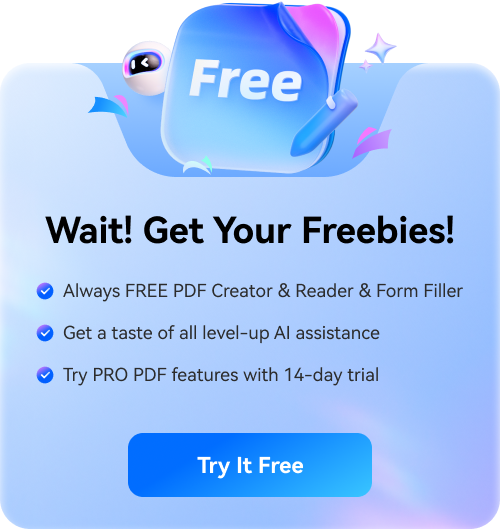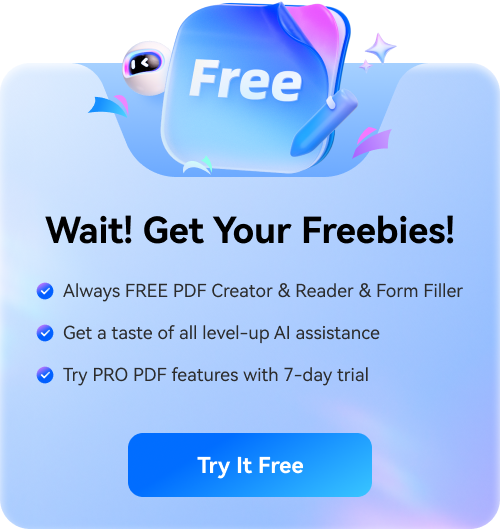An effective cover letter is a strong cover letter that consists of your experiences, skills, accomplishments, and outlines what you can bring to a company that others cannot. It is a way for you to explain to a hiring manager that you can add value to their company if you were to be hired. In this article, we'll explain why using a cover letter is still important, and how to write an effective cover letter for your job application.
- # Why You Still Need an Effective Cover Letter
- # What an Effective Cover Letter Should Contain
- # How to Write an Effective Cover Letter in PDF
Effective Cover Letter Template
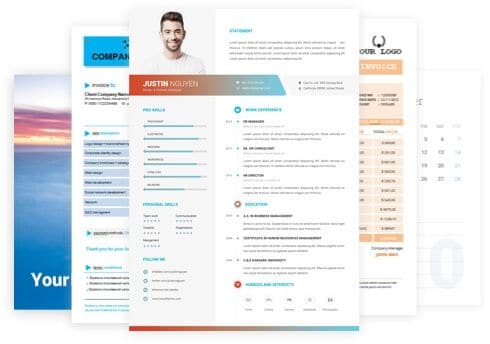
This is a free cover letter template. Free Download and customize it according to the sample text below.
Supported formats


Why You Still Need an Effective Cover Letter
Although a large amount of companies now prefer to use online job applications, when you're CV-dropping or applying to job positions online using job search websites, you'll still need to be able to write an effective cover letter to gain favour with the companies you apply to.
Cover letters are much more personalised than CVs, because they allow you to talk about the skills, experiences, and career history that you have on your CV without having to be as brief about it. You can write an effective cover letter than shows the kind of employee and person you are and elaborate on why you'd be a good addition to a company. A CV is a list, almost robotically typed, but a cover letter conveys a personality and a story.
Your cover letter is the first experience of you an employer will have. It's there to help you stand out, show off, and entice the employer into reading the rest of your application.
What an Effective Cover Letter Should Contain
In this section of our guide, we'll introduce a few key features for you to consider when writing an effective cover letter. Effective cover letters need to have a proper layout and sound professional to be able to do their job well and knowing how to write an effective cover letter in the correct way will be vital to your success. Here you'll also find a few effective cover letter samples that you can use when writing.
• Include contact information
When writing an effective cover letter, you should begin by including your contact information, and then the company's contact information. For you, this will include your name, address, postcode, email, and telephone number. For the company, this should include the name of someone at the company who is responsible for hiring new employees, the managers name, or something ambiguous like "Recruiting representative", "Recruiting department", or "Personnel".
• Direct your cover letter to a person
When writing an effective cover letter, one of the things that stands out the most at the beginning of a cover letter is when the note is directed to a person, rather than the company as a whole. If you can't find the name of an individual or manager to direct your cover letter to, call the company, and ask. You cover letter should start like this: "Dear Mr. Jobs," and continue on from there with the subject line and first paragraph.
• Subject line
A subject line is used to direct the letter or email reader's attention to the reason behind the letter before they read the whole page. It should look like this: "Re: Retail job opening". This should be written after "Dear Mr. Jobs," on the next like down.
• First paragraph
Your first paragraph should explain why you're writing to the company, which position you're applying for, and note any documents attached with the CV. It also briefly tells them why you might be a good fit for the position you're applying for. For example:
"I am writing to express interest in the Retail Associate position at your company. I am currently employed as a Sales Associate at Computers Limited, and I firmly believe that the skills and the experience that I have gained at this position make me an ideal candidate for your open position."
• Second paragraph
The second paragraph of your effective cover letter should further outline the skills and experience that you have which relate to the job position that you're applying for. For example, if you're applying for a retail position, think about the skills needed for retail (good customer service, time management, organisation) and use them to link your previous work experience to this new role.
• Third paragraph
The third paragraph you write should point out your attributes, further outlining your experiences and how you can bring something new to the company. Talk about where your talents lie, what you're good at, and what makes you an effective employee.
• Closing paragraph
A closing paragraph is used to professionally round off your cover letter. Briefly note how much you would enjoy working for this new company, and what you're willing to put in to your work. Remember that it's about what you can bring to the company, not about getting a new position that's better than your old one. Stay positive.
• Sign-off
Your closing statement and sign-off are the easiest part. Inform the reader that you hope to speak to them soon or wish them well. Then, sign-off with your name.
Using these effective cover letter samples and tips, you should be able to write an effective cover letter with ease.
How to Write an Effective Cover Letter in PDF
An effective PDF cover letter will help you land an interview effectively and quickly. Try the beautiful PDF cover letter template in this page and you won’t regret. To edit the template, you need to use Wondershare PDFelement - PDF Editor Wondershare PDFelement Wondershare PDFelement, a smart PDF editor. You can change the texts, images, signatures in the PDF template easily.

Step 1. Open the Cover Letter Template
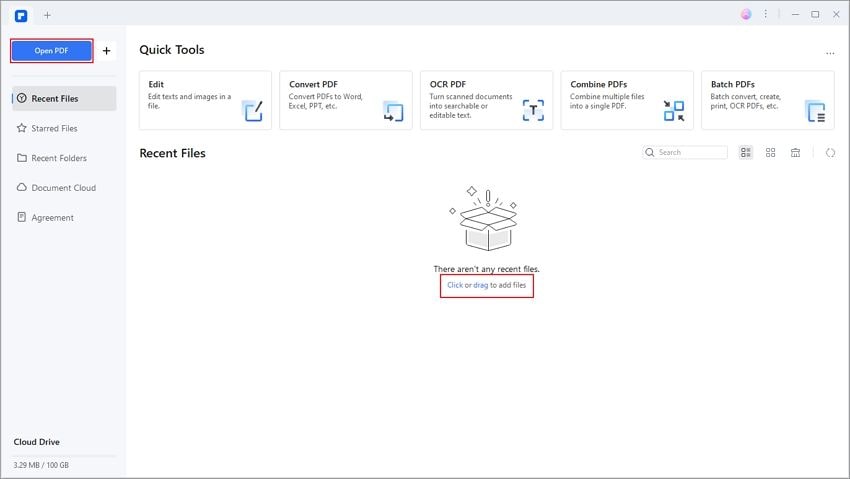
Step 2. Click on "Edit" and Enter Your Text as You Like
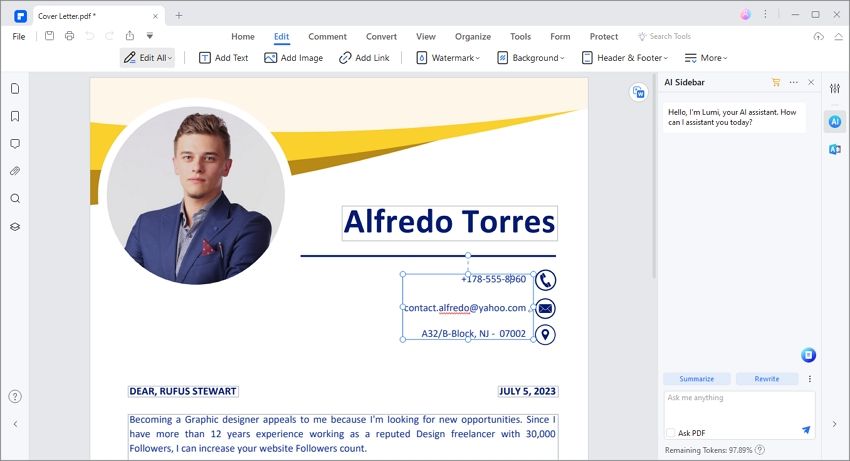
Step 3. Complete and Save Your Cover Letter
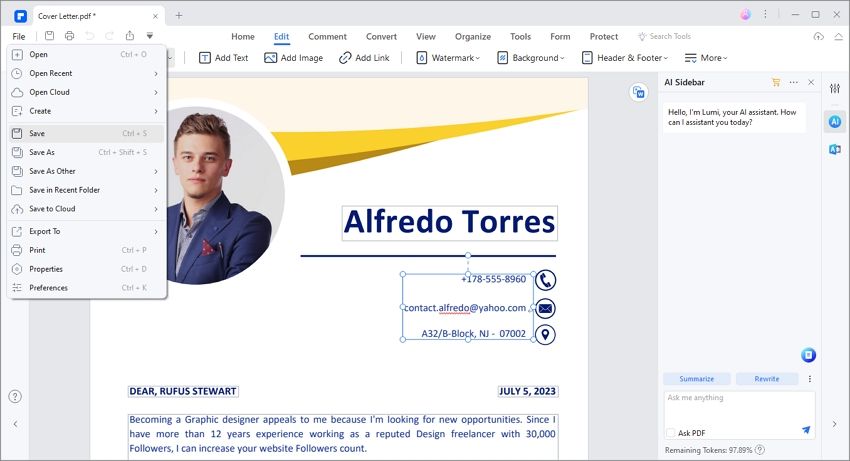
 Create and convert cover letter in PDF.
Create and convert cover letter in PDF. Edit cover letter in PDF.
Edit cover letter in PDF. Summarize, translate, proofread contents with AI..
Summarize, translate, proofread contents with AI..





